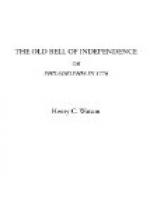“Colonel Zebulon Butler, with his family, escaped from the fort before the massacre, I believe?” observed Higgins, inquisitively.
“Yes; and in that I think he betrayed his trust. A commander should either conquer or die with his men,” replied Morton.
“But when slaughter is certain, I think every man is justified in doing all that he can to save himself,” said old Harmar.
“That is selfish. If slaughter was certain, would it not have been more honorable to remain, and make the enemy pay life for life, than it would be to steal away and leave women and children to fall without revenge?” observed Wilson.
“But would it be wise?” asked old Harmar, interrogatively.
“Whatever is honorable is wise,” replied Wilson.
STORY OF THE DAUPHIN’S BIRTHDAY.
“Mr. Mortan, what do you think was the most interesting scene you saw during the war?” enquired Mr. Jackson Harraar.
“Well, that’s a question it requires some thinking to answer,” replied Morton. “Leaving battle scenes out of view, I think the celebration of the Dauphin’s birth-day, in May, 1782, was one of the most interesting events I have ever witnessed.”
“It was a great celebration,” observed Higgins.
“You see,” began Morton, “our army was then encamped on the high grounds on both sides of the Hudson. The camp on the west side of the river was called New Boston, because the huts had been put up by the Massachusetts troops. The head-quarters of General Washington were at West Point. As our Congress had entered into an alliance with the king of France, General Washington thought it proper to seize every occasion of doing honor to our allies; and when the French were thrown into all sorts of rejoicing by the birth of an heir to the throne, he decided that we should celebrate the same event. The thirty-first of May was fixed upon for the celebration. Great preparations were made for the festival. In General Washington’s orders, invitations were given to all the officers in the army, and they were requested to invite any friend or acquaintance they might have in the country to join them. A romantic, open plain near West Point was chosen for the building of the great bower under which the company were to meet and partake of a grand feast. A French engineer, named Villefranche, was employed, with one thousand men, ten days in completing it, and, when completed, it was one of the most beautiful edifices I have ever seen. It was composed entirely of the material which the trees in the neighborhood afforded, and was about six hundred feet long and thirty wide. The roof was supported by a grand colonnade of one hundred and eighteen pillars made of the trunks of trees. The roof and walls were made of the boughs and branches of trees, curiously interwoven, while the ends were left open. On the inside, every pillar was enriched with muskets and bayonets, which were arranged in a fanciful manner; and the whole interior was decorated with evergreens, French and American colors, and various emblems and mottoes.




